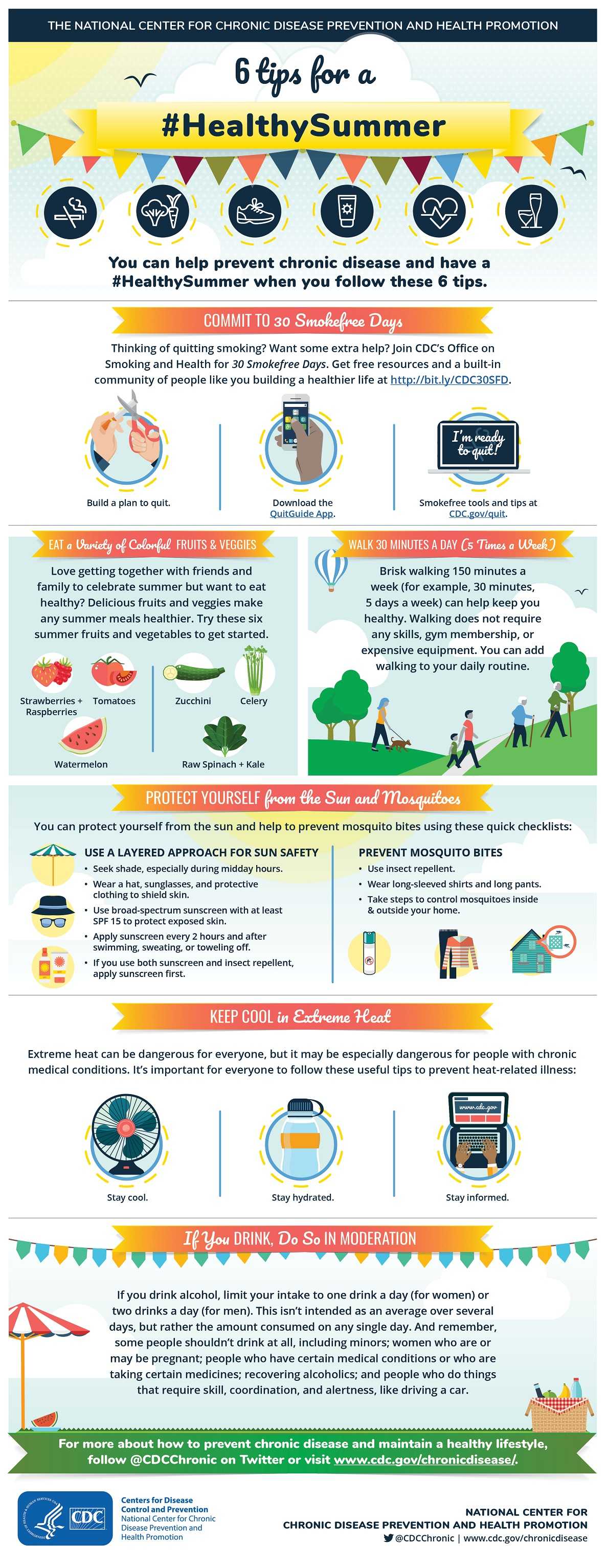Healthy Summer

Celebrate a Healthy Summer With These Six Tips
Long days. Warm nights. Fun in the sun. The joys of summer are at their peak nationwide during July and August, and it’s a great time to enjoy a trip to the park or backyard barbecue. CDC’s National Center for Chronic Disease Prevention and Health Promotion (NCCDPHP) offers these six tips to help you make the most of the season by getting active, eating well, and staying safe as the days heat up.
1. Quit smoking (start your healthier life).
Thinking of quitting smoking? Want some extra help? Join CDC’s Office on Smoking and Health for 30 Smokefree Days for free resources and a built-in community of people like you building a healthier life!
2. Eat healthy (even when celebrating).
Getting together with friends and family to celebrate summer days? Here are some ways to eat healthy foods and enjoy them together!
- Dive into some fresh summer fruits and vegetables and say no to fried snacks.
- Pass the cheese plate with calcium-rich low or fat-free options.
- Choosing healthy beverages like water and “rethink your drink!”
Refresh your options with a variety of resources for healthy recipes from CDC’s Division of Nutrition, Physical Activity, and Obesity.
3. Get active (but beware of the heat).
The summer’s a great time to get active. Regular physical activity can help lower your risk for heart disease, stroke, type 2 diabetes, depression, and some cancers. Staying active can also help control weight and improve sleep.
Did You Know? 150 minutes of moderate aerobic activity like brisk walking 30 minutes a day, 5 days a week, can help keep you healthy. <shareable>
- Take a walk. Walking is an easy way to start and maintain a physically active lifestyle, and there are lots of ways to beat the heat and walk your way toward a #HealthySummer. Mall walking and mall walking programs [PDF – 5.3 MB] can provide safe, convenient, and cool places for you to be active in the warmer months.
- Take a swim. Swimming and other water activities are excellent ways to get your physical activity. Whether in your own backyard, at the gym, or at a public pool, check out ways to get the health benefits of swimming while reducing the risk of getting hurt or sick.
- Play in a park. Get your play on! July is Park and Recreation Month. Play is important for both kids and adults—it helps with physical, mental, and social health. Whether at a national, state, or local park, get out and play.
- Use BAM! Body and Mind Physical Activity Cards. Interested in other activities like ballet, yoga, or golf? Whether you’re young or old, CDC’s BAM! Body and Mind Activity Cards provide lots of info and how-to’s on gear needed.
4. Protect yourself from the sun and mosquitos.
Summer is a time for fun and play, but remember to protect yourself from the sun and mosquitoes.
Skin cancer is the most common cancer in the United States, but most cases can be prevented. Anyone can get skin cancer, no matter their skin tone. It’s important to be sun smart when playing and working outdoors.
- Use a layered approach for sun protection.
- Seek shade, especially during midday hours.
- Wear a hat, sunglasses, and protective clothing.
- Use broad-spectrum sunscreen with at least SPF 15.
- Reapply sunscreen every 2 hours and after swimming, sweating, or toweling off.
Zika virus is one of several diseases that can be caused by mosquito bites. It can also spread through sex with a man or woman who has Zika—even if the person does not have symptoms. Many people infected with Zika won’t have symptoms or will only have mild symptoms. However, a pregnant woman, even one without symptoms, can pass Zika to her developing fetus, which can cause serious birth defects. Protect yourself and others. Learn more about how you can help prevent the spread of Zika.
- Prevent mosquito bites
- Use insect repellent.
- Wear long-sleeved shirts and long pants.
- Take steps to control mosquitoes inside and outside your home.
5. Keep cool.
Enjoy the longer daylight hours and warmer weather, but be cautious in extreme heat. Follow these tips to prevent heated-related illness, especially if you have a chronic medical condition:
-
- Stay cool.
- Wear lightweight clothing.
- Stay cool indoors: Take a cool shower or bath or move to an air-conditioned room. Use your stove and oven less.
- Schedule outdoor activities before and after the hottest hours of the day.
- Cut down on outdoor exercise during the heat
- Find some shade.
- Stay hydrated.
- Drink plenty of fluids—water is best! (Warning: If your doctor limits the amount you drink or has you on water pills, ask how much you should drink while the weather is hot.)
- Be careful in high heat.
- Check your local news for extreme heat alerts.
- Know the signs of heat-related illnesses and how to treat them.
- When working in the heat, keep an eye on your coworkers and have them do the same for you.
- If you are 65 or older, have a friend or relative call to check on you twice a day during a heat wave. (If you know someone in this age group, check on them at least twice a day.)
-
If you have diabetes, take special care. Type 1 and type 2 diabetes can change the way you are affected by heat. Use this summer checklist to make sure you’re covered:
- Drink plenty of water.
- Test your blood sugar often.
- Keep medicines, supplies, and equipment out of the heat.
- Stay inside in air conditioning when it’s hottest.
- Wear loose, lightweight clothing.
- Get medical attention for heat-related illness.
- Make a plan in case you lose power.
- Have a go-bag ready for emergencies.
- Stay cool.
6. If you drink alcohol, do so in moderation.
The 2015–2020 Dietary Guidelines for Americans recommends that if you drink alcohol, you should limit your intake to one drink a day (for women) or two drinks a day (for men). This isn’t intended as an average over several days, but rather the amount consumed on any single day. And remember, some people shouldn’t drink at all, including minors; women who are or may be pregnant; people who have certain medical conditions or who are taking certain medicines; recovering alcoholics; and people who do things that require skill, coordination, and alertness, like driving a car.
Additional Content for Infobytes:
Sleep 7 or More Hours a Night
Are you getting enough sleep?
When you don’t get enough sleep every day, you may be at an increased risk for obesity, type 2 diabetes, high blood pressure, heart disease and stroke, poor mental health, and even early death.
-
- Be consistent. Go to bed and get up at the same time each day, including on the weekends.
- Make sure your bedroom is quiet, dark, relaxing, and at a comfortable temperature.
- Remove electronic devices such as TVs, computers, and smart phones from the bedroom.
- Avoid large meals, caffeine, and alcohol before bedtime.
- Avoid tobacco/nicotine.
- Get exercise. Being physically active can help you sleep.
- Page last reviewed: August 3, 2017
- Page last updated: August 3, 2017
- Content source:



 ShareCompartir
ShareCompartir